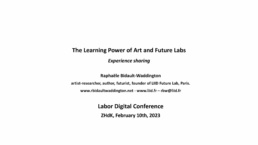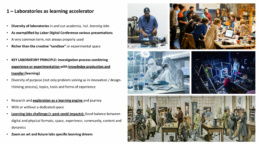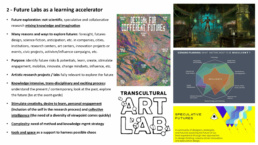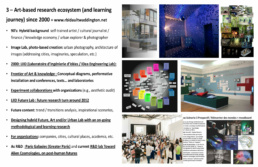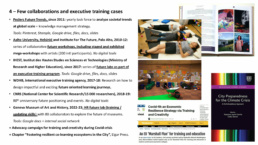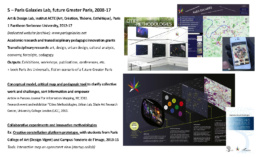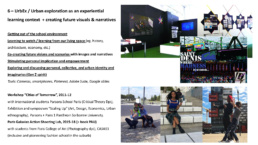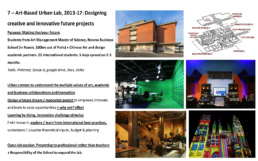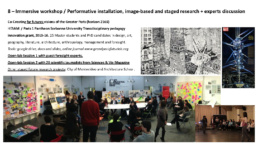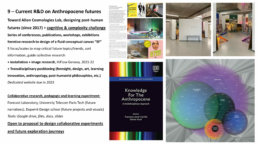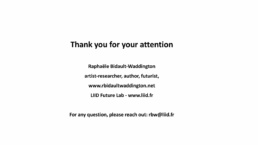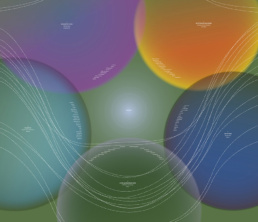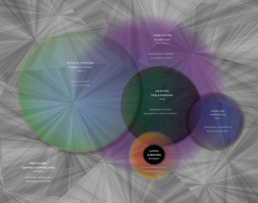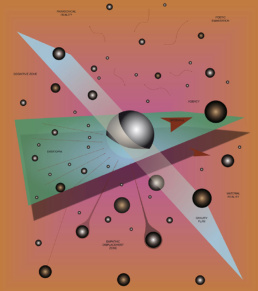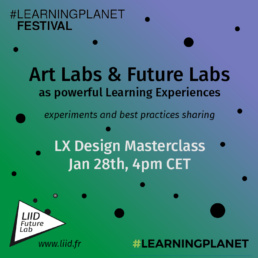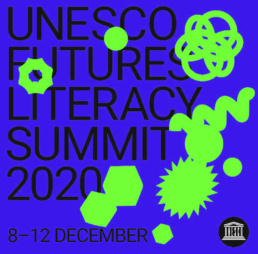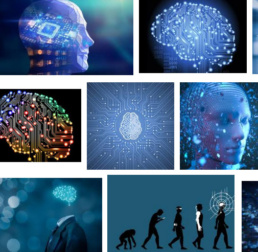Designing Art-Based Future Labs
closing keynote
Labor Digital International Conference, ZHdK (Arts Academy), Zurich, 2023
In this conference at the Art academy of Zurich, Raphaële Bidault-Waddington is invited to present her various artistic and future research laboratories and to show how they foster transdisciplinary knowledge production and sharing, facilitating learning through investigation and collaborative experimentation.-Her R&D lab Paris Galaxies on the Future of Greater Paris has made it possible to prototype numerous methodologies from 2012 to 2017, whether through images, stories, projects or workspaces - including in the urban space which becomes a playground and learning terrain. Following this lab, TAC Future Lab has been experimenting with other exploratory modalities since 2017.–In the introduction, she reformulates a definition of the laboratory as a conceptual and fluid framework to structure and carry a research process around critical issues, using a diversity of methodologies and formats, that can be artistic, academic, prospective, innovative, or hybrid.
Presentation
Raphaele Bidault-Waddington, is the founder of LIID Future Lab, a foresight research platform designing future labs in artistic, academic, urban and corporate contexts.
From 2012 to 2017, its multi-awarded lab on the future Greater Paris metropolis (with Paris 1 Pantheon Sorbonne University) prototyped a series of mixed future research and transdisciplinary pedagogic innovations. Its latest R&D lab “Toward Alien Cosmologies” addresses post-human futures and continues innovating at the frontier of future research, art and co-learning.
Interview following the conference
What does the format of the lab/laboratory mean to you?
Historically laboratories were specific spaces where to access certain tools, make experiences or design and test experimental protocols in order to extract learnings, to innovate or to produce (scientific and non-scientific) knowledge. The concept of laboratory is in fact rather fluid. In a more recent time, other types of laboratories without specific tools and places, such as learning lab, urban labs, living lab, future lab, art lab, and so on, have emerged. Philosopher Bruno Latour has even introduced the idea that the real world should be the laboratory to learn directly from.
As an alternative definition, in the last twenty years, I have been using the notion of laboratory as a conceptual frame to design, organize and unfold a research process, geared toward a certain critical challenge or topic, and combining experiences or experiments, and learnings (knowledge production and sharing). These learnings can be considered scientific if the lab respect academic rules and protocols, and positions them in relation to a discipline’s state of the art. But they can also be hybrid, peri-scientific or non-scientific when other methods, experiments and knowledge formats are used.
The labs I create as an artist-researcher and future lab designer, always have a speculative dimension, and mix artistic, future, urban and transdisciplinary academic research methods, experiences and formats. Then a laboratory can be very short or very long (from one day to several years), evolve through time (different than a project or a production with a clear expected output), more or less open and collaborative, and involve a small or large number of participants.
What’s your favorite project that explores the future with a lab perspective?
My most thrilling project at the moment is the future lab “Toward Alien Cosmologies” that I started in 2017 to explore Artificial Intelligence future implications, and then expanded to the Anthropocene and post-Truth paradigms, which raise similar holistic future challenges. This lab is my most advanced future research where I’m trying to design new ways of exploring possible future worlds (cosmologies) when everything and at all scales, is radically uncertain.
The Anthropocene requires that we reinvent the way we live on Earth; AI (and technologies) challenges human capacities, certitudes, and politics and raise deep ontological issues; and the post-Truth shakes our relation and trust in any form of truth, as if everything has become somehow alien. This paradigm calls for a profound anthropological and transdisciplinary epistemological reset, which cannot be address with conventional rationality and that’s why and where Art is important. This lab is certainly not reasonable, in all the senses that term can take.
It also echoes post-humanist questions and philosophies as I develop in my article “Designing post-human futures” in Knowledge For the Anthropocene (E. Elgar Press, 2021).
A dedicated website, recollecting all the lab’s research episodes (workshops, exhibitions conferences and publications in France, US, Norway, Germany, Switzerland, etc.) since 2017 is due later this year.
Suite de l’interview sur le site du E-Learning Lab de ZHdK
Intervention slides
About Labor Digital Conference
The conference will explore the questions of which scientific and historical foundations today’s labs are based on. Which exploratory learning and teaching forms, which interdisciplinary methods are lab-specific and what potential does the digital laboratory have for inspired, critical thinking?
Will the learning of the future take place in labs? Can experimental, explorative learning with experts and peers facilitate innovative forms of teaching and learning?
What role does digitality play, and what artistic and design-oriented approaches are we developing in labs? And how can we integrate these methods as small interventions in teaching practice or use them as an entire teaching unit? We will explore these questions analytically and playfully at the LaborDigital conference.
Programme de la conférence : https://paul.zhdk.ch/course/view.php?id=2312#section-2
Compte-rendu de la conférence : https://elearning.zhdk.ch/experience/labordigital-experimental-learnings-an-der-zhdk-1
Research axes reminder
Axis 1: Transitions & Future Worlds
Axis 2: Foresight Methodology Innovation
Axis 3: Art & Future Research
Related articles
Futurescape: Art x Future x Learning x IA, ISC Campus, Paris, 2023-24
Artistic and prospective exploration program over a year including an interactive installation, experiential workshops,…
limit/no limit, Art & Design Research Conference, Paris, 2024
RBW zooms in on the TAC Future Lab work related to knowledge, whether it be the cognitive value of artistic formats,…
Art & Future Research, Alliance for Artistic Research in Universities, USA, 2022
RBW retraces the development of her laboratories, starting from their roots in the legacy of conceptual and…
Art & Future Labs as LX, Learning Planet Festival, 2022
RBW shared a wide range of artistic, urban and prospective research experiences (including TAC Future Lab), showing how…
Art x Futures, ‘Blended Futures’ Foresight Journal panel, UNESCO FL Summit, 2020
Drawing on a large scope of international examples, the presentation builds on how artistic productions have been…
Future x IA x Speculative Design, Duperré Design School, Paris, 2018
In this workshop cycle on the future of/with AI, students discover the critical future challenges raised by AI, and…
